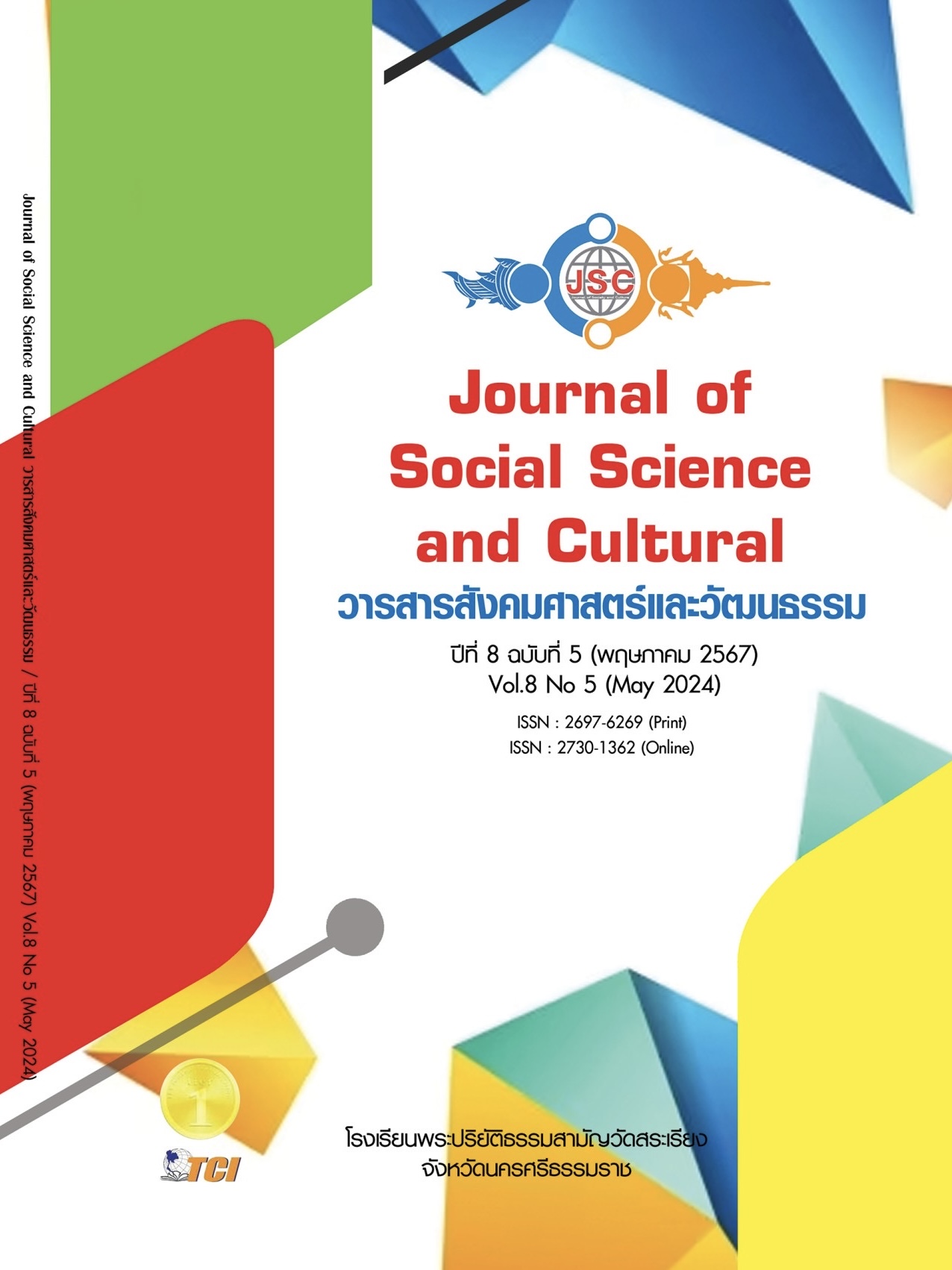POLICY FOR DRIVING THE COMMUNITY ECONOMY WITH SOFT POWER FOR SUSTAINABLE DEVELOPMENT
Main Article Content
Abstract
This article aims to present a policy perspective for driving the community economy with Soft Power for sustainable development through the policy of 1 family, 1 skill. Soft Power for the development of the grassroots economy still has challenges in the issue of potential development. This is because more than half of the low-income population are people who do not participate in economic activities. Have a low level of education and skills Including the implementation of government policies which are separated from the central government. Unable to answer the different problems in each area, it is a chain problem that prevents the country from developing. Therefore, policies to drive the community economy efficiently Emphasis should be placed on developing the potential and capacity of the grassroots economy. Especially personal development by creating soft power at the local level, it will be successful. It is not only that the government wants to find out what resources the area has. These traditional cultures are already accepted in local areas and some parts of Thailand. Therefore, the government must have a duty to set goals for raising the level of soft power, such as focusing on driving the policy of 1 family, 1 soft power skill, starting with "human development" and bringing valuable "intellectual assets" to be known around the world. Create more jobs and increase income Focusing on managing the entire system from upstream, midstream, and downstream through a process that drives 5 gears, starting with access to production factors. Knowledge creation, marketing, communication creates awareness. And management, such as supporting the development of OTOP products by developing the grassroots economy to create opportunities and social equality.
Article Details
References
กรมการพัฒนาชุมชน. (2566). แผนปฏิบัติราชการรายปี พ.ศ. 2566. เรียกใช้เมื่อ 1 มกราคม 2567 จาก https://nan.cdd.go.th/wp-content/uploads/sites/27/2022/10/แผนปฏิบัติราชการรายปี-พ.ศ.-2566.pdf
ชล บุนนาค. (2566). ข้อมูลเบื้องต้นเกี่ยวกับ SDGs. เรียกใช้เมื่อ 1 มกราคม 2567 จาก https://www.sdgmove.com/intro-to-sdgs/
ณดา จันทร์สม. (2566). ขับเคลื่อนเศรษฐกิจสร้างสรรค์เป็นซอฟท์พาวเวอร์เพื่อการพัฒนาที่ยั่งยืน. เรียกใช้เมื่อ 1 มกราคม 2567 จาก https://nida.ac.th/economy-into-soft-power-for-sustainable-development/
ปรีชา เรืองจันทร์. (2563). การเมืองเศรษฐกิจ และสังคม = Politics, Economy and Society. (ฉบับปรับปรุง). (พิมพ์ครั้งที่ 4). พิษณุโลก: มหาวิทยาลัยนเรศวร.
พิกัดข่าว. (2567). นายกฯนำผ้าย้อมครามบ้านดอนกอยสู่เวทีโลกเพิ่มมูลค่าผลิตภัณฑ์. เรียกใช้เมื่อ 1 มกราคม 2567 จาก https://www.phigudkhaow.com/
ภุชงค์ เสนานุช และคณะ. (2566). ชาวบ้านในชุมชนมีความเห็นอย่างไรต่อนโยบายการพัฒนาเศรษฐกิจฐานรากเพื่อการพัฒนาที่ยั่งยืน. ศูนย์วิจัยและสนับสนุนเป้าหมายการพัฒนาที่ยั่งยืน. เรียกใช้เมื่อ 2 มกราคม 2567 จาก https://www.sdgmove.com/2023/01/24/
มนตรี รอดแก้ว. (2565 ). ความสัมพันธ์ระหว่างการเมือง เศรษฐกิจชุมชนและสังคม. วารสารนิสิตวัง, 24(1), 31-40.
เมธี ทรัพย์ประสพโชค. (2564). การพัฒนาเศรษฐกิจชุมชนในภาวะโรคระบาดโควิด-19 บนพื้นฐานหลักปรัชญาเศรษฐกิจพอเพียง. วารสารวิชาการมนุษยศาสตร์และสังคมศาสตร์ มหาวิทยาลัยราชภัฏธนบุรี, 4(3), 113-124.
สถาบันพัฒนาองค์กรชุมชน. (2564). เศรษฐกิจฐานราก. เรียกใช้เมื่อ 2 มกราคม 2567 จาก https://web.codi.or.th/
สำนักงานกองทุนสนับสนุนการวิจัย. (2560). ยุทธศาสตร์ Soft Powers ของไทย: บทเรียนจากจีนญี่ปุ่นและเกาหลีใต้สู่การประยุกต์ใช้ของไทย. เรียกใช้เมื่อ 2 มกราคม 2567 จาก https://aseanwatch.org/2017/02/18/trf-asean-public-forum-soft-power/
สำนักงานสภาพัฒนาการเศรษฐกิจและสังคมแห่งชาติ. (2566). สถิติด้านความยากจนและการกระจายรายได้. เรียกใช้เมื่อ 1 พฤษภาคม 2567 จาก https://www.nesdc.go.th/main.php?filename=social
สำนักส่งเสริมและขับเคลื่อนเครือข่ายทางสังคม. (2566). รับมอบนโยบาย รมต.วธ. มุ่งพัฒนา 1 ครอบครัว 1 Soft Power. เรียกใช้เมื่อ 1 พฤษภาคม 2567 จาก https://moralcenter.or.th/%html
สุรชาติ บำรุงสุข. (2557). Soft Power. กรุงเทพมหานคร: สำนักข่าวกรองแห่งชาติ.
หทัยชนก คะตะสมบูรณ. (2563). การพัฒนาศักยภาพของชุมชนเพื่อสร้างเศรษฐกิจฐานรากอย่างยั่งยืน: กรณีศึกษาตำบลเนินศาลา อำเภอโกรกพระ จังหวัดนครสวรรค์. วารสารสันติศึกษาปริทรรศน์ มจร, 8(2), 473-488.
อิงอร เนตรานนท์. (2562). พลังอำนาจแห่งชาติซอฟท์เพาเวอร์ของไทยในศตวรรษที่ 21. ใน ดุษฎีนิพนธ์ปรัชญาดุษฎีบัณฑิต สาขาวิชารัฐประศาสนศาสตร์. มหาวิทยาลัยรังสิต.
เอนก เหล่าธรรมทัศน์. (2556). สองนคราประชาธิปไตย: แนวทางปฏิรูปการเมือง เศรษฐกิจเพื่อประชาธิปไตย. (พิมพ์ครั้งที่ 8). กรุงเทพมหานคร: คบไฟ.
Hartman, F. (2018). National power in international relations, Past Exams for International Relations. Retrieved January 2 , 2024, from https://www.docsity.com/en/national-power-in-internationalrelations
Standard Team. (2023). Learn about the Pheu Thai Party's 1 family, 1 soft power policy. Retrieved January 2, 2024, from https://thestandard.co/one-family-one-soft-power/
Toffler, A. (1981). Third Wave. London: Pan Books.


